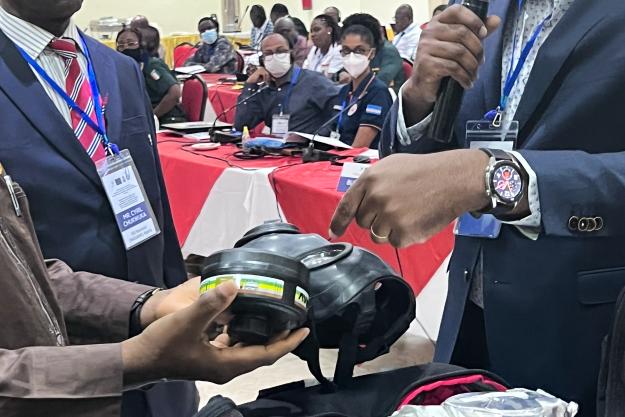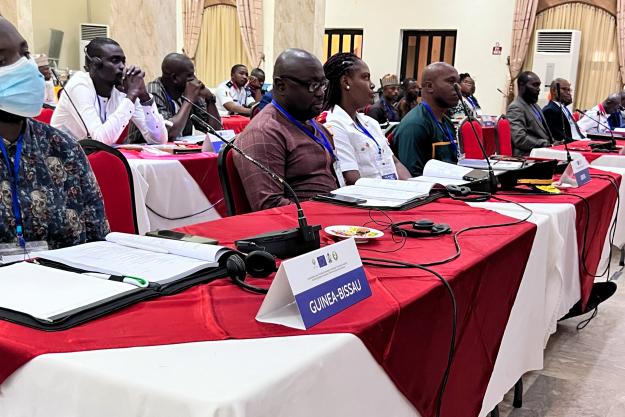If a chemical weapons attack or an incident involving toxic chemicals occurs, first responders need to be ready to respond to the emergency and to protect the local population.
To support these response capabilities, the Organisation for the Prohibition of Chemical Weapons (OPCW) and the Government of the federal Republic of Nigeria co-organised a training course in Abuja, Nigeria, for first responders in the Economic Community of West African States (ECOWAS) States Parties. The training took place from 14 to 18 June, with financial support from the European Union and as part OPCW's Programme to Strengthen Cooperation with Africa on the Chemical Weapons Convention.
The course was designed to help first responders expand their emergency response and protection capabilities against chemical warfare agents and toxic chemical incidents. Delivered by OPCW experts and a team of instructors from Kenya and the Seychelles through OPCW's instructor exchange programme, the course covered the use of individual and collective protective equipment as well as monitoring, detection, and decontamination equipment and techniques. Experts also provided instruction on how to conduct sampling and analysis in contaminated areas.

In his opening remarks, Mr Shehu Ibrahim, the Permanent Secretary and Chairperson of the Nigerian National Authority on Chemical and Biological Weapons Conventions, stated: "Nigeria is committed to cooperating with the OPCW to support States Parties in the region to develop technical and operational capabilities in the field of protection and assistance to deal with incidents involving chemical weapons and other toxic chemicals."
The OPCW Programme Officer responsible for coordinating the course, Mr Babatunde Olowookere, underlined: "It is extremely important to build reliable national and regional capacities to protect citizens during chemical emergencies. The timely and efficient response to these incidents cannot be underestimated. The skills and knowledge acquired are essential to boosting regional capacity."
The training was attended in person by 38 representatives from 12 OPCW Member States in ECOWAS: Benin, Burkina Faso, Cape Verde, Côte d'Ivoire, Ghana, Guinea, Guinea-Bissau, Liberia, Nigeria, Senegal, Sierra Leone, and Togo.

Background
The Programme to Strengthen Cooperation with Africa on the Chemical Weapons Convention - known as the Africa Programme - focuses on the needs of OPCW Member States on that continent, including the promotion of uses of chemistry for peaceful and authorised purposes to support a developed, safe, and secure Africa.
The Africa Programme is based on triennial planning and has completed four phases since its inception. A fifth phase was launched in January 2020 and covers the period 2020-2022. The design of this phase is based on a need assessment followed by wide and inclusive consultations with the African Member States. The Programme benefits from voluntary contributions of a number of OPCW Member States.
As the implementing body for the Chemical Weapons Convention, the OPCW, with its 193 Member States, oversees the global endeavour to permanently eliminate chemical weapons. Since the Convention's entry into force in 1997, it is the most successful disarmament treaty eliminating an entire class of weapons of mass destruction.
Over 99% of all declared chemical weapon stockpiles have been destroyed under OPCW verification. For its extensive efforts in eliminating chemical weapons, the OPCW received the 2013 Nobel Peace Prize.






